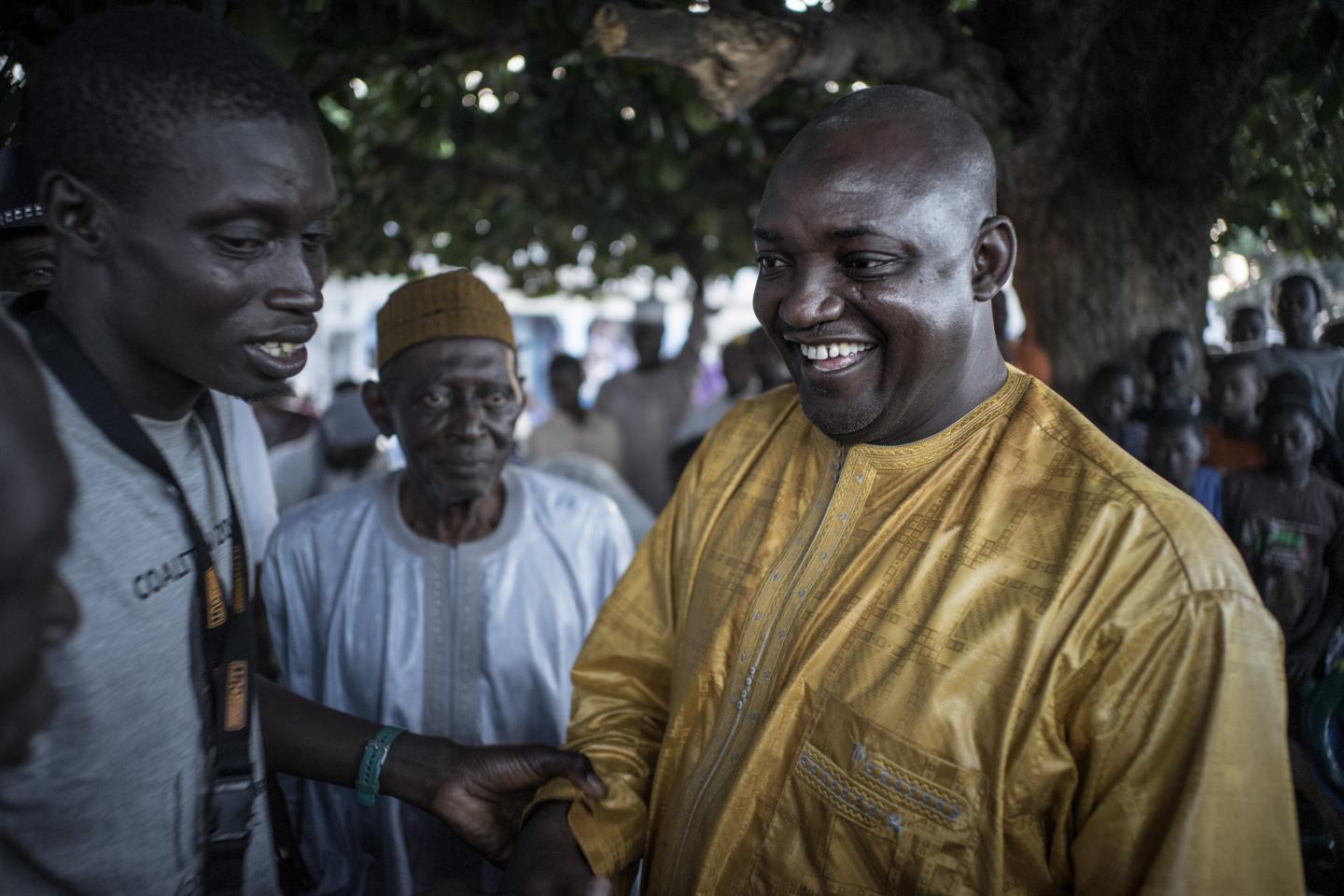A political crisis is growing in The Gambia, where President Yahya Jammeh has declared a state of emergency after refusing to admit defeat in last month’s elections. With his term in office due to expire on Thursday, what happens next?
What is the significance of the state of emergency?
Mr Jammeh’s declaration of a state of emergency on his penultimate day in office has raised the stakes in his battle to remain in power.
The Gambian president said the state of emergency would prevent a power vacuum while the Supreme Court considered his legal challenge to December’s election result. It cannot sit until at least May, due to a lack of judges, who must be provided by The Gambia’s West African neighbours.
Analysts said the move clearly signalled his rejection of mediation efforts and his intention to continue governing after his term ends.
Where does this leave the election winner, Adama Barrow?
Mr Barrow, who is in neighbouring Senegal, said before the declaration of the state of emergency that his inauguration would go ahead on Thursday on Gambian territory.
The plan was for the swearing-in ceremony to take place at the National Stadium in Bakau but, given Mr Jammeh’s latest moves, those plans must now be viewed as being in severe doubt.
There had also been no word on who would conduct the swearing-in – it is usually done by the country’s chief justice but lawyers say that, under the Gambian constitution, this is not necessary and it could be carried out even by a commissioner of oaths.

MARCO LONGARI/AFP/GETTY
How are the Gambian people reacting?
Tension is high in the Gambian capital, Banjul, over concerns that the political conflict will continue to escalate. Checkpoints across the city are being manned by heavily armed security forces.
Thousands of people have fled to neighbouring countries or rural areas, fearing that violence may erupt. Before the declaration of the state of emergency, Mr Barrow’s coalition urged Gambians to “exercise restraint, observe the rule of law and not to respond to provocation”.
The BBC’s Umaru Fofana, who is in Banjul, says people there are petrified. They are stocking up on food and water. Everyone is praying for a peaceful resolution, he says.
What is Mr Jammeh’s position?
Mr Jammeh, who seized power in a 1994 coup, initially accepted that Mr Barrow had won the election but later reversed his position and said he would not step down.
He filed a petition to the Supreme Court, challenging the election results, and says the existence of this legal process means it would be unconstitutional for Mr Barrow to assume office.
He also asked the Supreme Court for an injunction to stop the inauguration but the chief justice declined to rule on it, saying he must recuse himself from any case that could affect his own position – he would normally conduct the swearing in ceremony.
The secretary general of the Gambia Bar Association, Aziz Bensouda, said any such injunction would be unconstitutional.
Why is Mr Jammeh refusing to leave office?
Mr Jammeh has said there were irregularities in the election process, including the turning away of some of his supporters from polling stations, and errors made by the electoral commission.
The commission accepted that some of the results it initially published contained errors, but said Mr Barrow still won.
Mr Jammeh has said he will stay in office until new elections are held. Retaining power would also ensure he was not prosecuted in The Gambia for alleged abuses committed during his rule.
How have his allies reacted?
Ministers are continuing to desert Mr Jammeh’s government. Four cabinet members, including the ministers of finance and foreign affairs, resigned on Tuesday. They join another two, who quit last week over the president’s refusal to accept electoral defeat.
One of the ministers who resigned, former information chief Sheriff Bojang, said Mr Jammeh’s arguments had a “veneer of constitutionalism” but were an attempt to subvert the will of the Gambian people. The international community has sided with Mr Barrow, saying he won fairly.
The Gambian army chief has declared his loyalty to Mr Jammeh.
The elite regiment of the army is also fiercely loyal, but other elements of the military may be less so.
Correspondents say there has been talk that some are unhappy with recent events and want a peaceful resolution.
What is happening at the Supreme Court?
Judges from Nigeria and Sierra Leone have been hired to hear the petition to overturn the election result, but they have yet to arrive in Banjul.
Gambian chief justice Emmanuel Fagbenle has said the court will be able to convene no earlier than May, and possibly not until November, because the Nigerian who is to act as court president, Onogeme Uduma, is fully booked for the coming months.
How are neighbouring countries reacting to the crisis?
The West African regional bloc Ecowas has tried to persuade Mr Jammeh to step aside, so far unsuccessfully.
Regional sources have said force is now being considered. West African countries are preparing a joint force to intervene militarily if Mr Jammeh does not go, Reuters has reported Nigerian military sources as saying.
Nigeria has despatched a warship to waters off The Gambia, while Senegal, which almost entirely surrounds its smaller neighbour, would be expected to lead any military intervention.
“A decision has been taken that he will not remain president of [The] Gambia at the expiration of his tenure,” Reuters quoted one Nigerian military source as saying.
Those comments suggest the immediate consequence of Mr Jammeh failing to hand over power would be that neighbouring and other African countries would no longer recognise him as The Gambia’s head of state (the African Union said as much last week) not that a military intervention was imminent or inevitable.
How might this be resolved?
Mr Barrow has distanced himself from comments, made by other opposition figures, suggesting Mr Jammeh may be prosecuted over alleged abuses in power.
He said Mr Jammeh should be able to stay in The Gambia and would be honoured as, and receive the privileges of, a former head of state if he stepped down.
However, analysts say Mr Jammeh is unlikely to be persuaded by his opponent’s apparently conciliatory language.
Another option, raised by Nigerian MPs, is that Mr Jammeh could be offered asylum and a comfortable retirement in another African country.
Besides Nigeria, Morocco has been mooted as a possible destination (Mr Jammeh’s wife is Moroccan).
A third possibility has been made more likely by Mr Jammeh’s declaration of a state of emergency – that, in the absence of a clear court ruling, Mr Jammeh attempts to cling to power with army backing, pending military intervention by regional powers.


